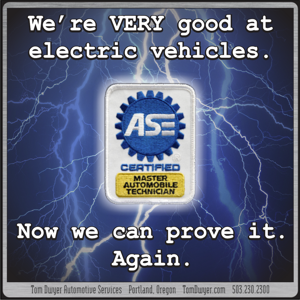Do you own a hybrid or full-electric vehicle? Thinking of buying one? Deciding to upgrade to an electric vehicle is just the first step on a long path. Once you’re the proud owner, where will you go for the expert service you need? You might not know that until 2014 there was NO ONE in the country certified as qualified to work on electric or hybrid vehicles! It’s not that the Techs weren’t capable, but there wasn’t any such thing as hybrid/electric certification at all. The National Institute for Automotive Service Excellence (ASE, the group that certifies auto technicians) stepped in to change that in 2015 with the first ASE Hybrid and Electric certification. We’re proud to say Tom Dwyer Automotive was an early adopter of the new certification with our first Hybrid and Electric Technician certified in July of 2016. He’s moved on since then so we didn’t have a Hybrid-certified for a while, but no longer! We’d like to congratulate Jamie Brooks, who was already a Master Certified Technician, for earning his L3 Hybrid and Electric certification this month. And we have more on the way! Here’s exactly what that means to you…
Congratulations to Jamie Brooks!
First, we’d like to congratulate Jamie Brooks, an ASE-Master-Certified Technician who’s been with us since 2021, for earning his L3 Hybrid and Electric certification. To emphasize how special Jamie’s achievement is let us pass along an observation from Dan Baumhardt, a manager at ASE. “Look at the numbers on the ASE Statistics Page. Of the approximately 222,000 ASE-certified technicians, only 3,409 have earned the L3 credential. Jamie has joined an elite group of service professionals that have passed a challenging exam covering the diagnosis and repair of the high voltage systems on these high tech vehicles. Passing this advanced level exam is quite an accomplishment.”
To put this into perspective, Toyota, the leader in hybrid/electric vehicle market share, has about 1500 dealerships in the US and Canada. That means if there’s just one ASE-certified hybrid/electric Technician at every Toyota dealership, then the other dealers and independent shops around the country have to split the remaining 1,909 Certified Techs among themselves! There just aren’t enough qualified folks to go around yet, so please forgive us if we brag a little. We’re very proud of Jamie, proud of our whole Technical staff, and very proud that least 2 more Tom Dwyer Technicians are following Jamie to get their Hybrid/Electric certifications soon.
Crash Course on ASE Certification
ASE was created in 1972 to test and certify that auto repair shops and Technicians in the US and Canada are competent and qualified. ASE currently offers certifications in Automobile, Collison Repair, Medium-Heavy Truck, School Bus, Transit Bus, and Truck Equipment areas. Each of these areas has several sub-tests within it. For example the Automobile certification, the one carried by all Dwyer Technicians, covers these areas…
Engine Repair Automatic Transmission/Transaxle
Manual Drive Train & Axles Suspension & Steering
Brakes Electrical/Electronic Systems
Heating & Air Conditioning Engine Performance
To be ASE-Certified a Technician must pass any one of these sections, but to be ASE-Master-Certified they must pass all eight. In addition, Master Technicians must have at least two years of relevant hands-on work experience and must recertify in each test area every five years.
Beyond the Master level, Technicians can pursue the Advanced, or “L”-Level certifications of L1 (Advanced Engine Performance Specialist), L2 (Electronic Diesel Engine Diagnosis Specialist), and now L3 (Light-Duty Hybrid/Electric Vehicle Specialist). Service Advisors and Auto Shops aren’t immune from the piercing gaze of ASE, either. Service Writers have their own C1 Service Consultant Certification, and shops can apply for the stringent Blue Seal Certification.
The L3 Hybrid/Electric Certification
Now that you know how ASE works, the value to you of the new L3 Certification probably makes sense. The soaring popularity of hybrid and electric vehicles means a new generation of Technicians has to be trained to repair and maintain the new technology, so ASE created the L3 certification to address the issues specific to hybrid and electric vehicles. The new program was announced in November of 2014, and the first Technicians only earned their certifications in June of 2015. As with all automotive fields the technology is constantly changing, so as with the other Advanced Level areas the L3 will require recertification every 5 years.
“Industry Standards” vs. “Tom Dwyer Standards”
Not all shops rely on Certified Technicians for all, or even most of their work. It’s common for shops to have a crew of untrained, inexperienced, or un-certified people doing the bulk of the work under the supervision of a couple Certified Technicians and maybe one Master Technician, usually the shop manager. To be Blue Seal Certified, 75% of a shop’s Technicians must be Certified, and each area of service must be covered by a Technician certified in that area. Very few auto shops even qualify for Blue Seal status.
At Tom Dwyer Automotive we go far beyond the industry standard. We currently employ ten Technicians; two are ASE-Certified, the other eight are ASE-Master-Certified, and most carry advanced certifications outside of ASE. All four of our Service Advisors are not only non-commissioned, but they’re all ASE-Certified as Service Writers.
Before the L3 Certification, we distributed work on hybrid/electric vehicles between our various Master Technicians. Their years, even decades of experience meant they had the background, creativity, and flexibility to deal with the new vehicles flawlessly. Our 24/24 Warranty backed their work and our 99.72% Satisfaction rating seems to indicate they were doing a pretty good job. However, that just meant we knew they were capable and qualified. Now, with the L3 Certification you don’t have to take our word for it… you can have the same confidence in their work that we do. Electric vehicles are the future, and now you can be assured we’ll be ready to care for your electric vehicle when you’re ready to make the switch.














